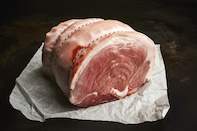
South African Pork Producers Organisation (SAPPO) represents the voice of farmers when it comes to negotiations with government and other stakeholders and role-players across the supply chain.
As such, South African Pork Producers' Organisation (SAPPO) represents the interests of members in negotiations relating to imports and exports, tariffs, market negotiations, disease management and input and marketing costs.
South African Pork Producers' Organisation Members enjoy the benefits of generic marketing of pork meat, which has resulted in a significant increase in pork consumption thanks to consumer education, in-store tastings and promotions.
Along with other role-players and the Pig Veterinary Association, SAPPO has also created a Pig Welfare Code to ensure humane handling of pigs, Recommended Biosecurity measures to reduce the risk of diseases entering a farm, which could cause unnecessary suffering, as well as a compartmentalisation system, to ensure low risk producers are able to continue production if their farms are unaffected during infectious disease outbreaks.
SAPPO has also launched a Farm Assured accreditation, called Pork 360, to guarantee best practices and processes from farm to fork. Participating members are audited independently to ensure they comply with prescribed standards in terms of food safety, traceability, animal welfare, biosecurity and environmental stewardship.
Besides this, South African Pork Producers Organisation (SAPPO) members share in the benefits of the National Pig Health Monitoring Scheme, training material and are regularly exposed to overseas experts during farmers’ days, study groups and symposiums to keep them abreast of the latest international production and marketing trends.
Research is seen as one of the pillars of sustainable pork production, so SAPPO has a Research Portfolio Committee that identifies, initiates and ensures funding is invested in research that addresses the needs of producers. SAPPO, for example, has obtained the licence to conduct tests to identify the gene that causes porcine stress syndrome, which has a negative impact on meat quality.
 SouthAfrica.co.za offers a guide to pig farming in South Africa. The commercial pig industry in South Africa is relatively small with a few ...
SouthAfrica.co.za offers a guide to pig farming in South Africa. The commercial pig industry in South Africa is relatively small with a few ...